Is Qatar Double-Dealing Over Libya: Gaddafi’s ex-Spy Chief Still Enjoying Impunity

Qatar was the first Arab nation to support the NATO operation in Libya by sending its jets and was praised by NTC leaders soon after the 'liberation', however, recent revelations raise questions regarding the country's ambivalent stance on Libya.
Following the death of former leader Muammar Gaddafi and with efforts now focusing on the reconstruction of Libya, NTC leader Mustafa Abdul Jalil met with Qatari Amir Sheikh Hamad bin Khalifa Al-Thani, to discuss the aftermath of the conflict and the future of their bilateral relations.
Soon after the NTC declaration of Liberation HH Sheikh Tamim bin Hamad, the Deputy Emir and Heir Apparent praised the NTC, NATO, and the role played by Qatar during the conflict.
"We want to explain to everyone and to all the Libyans that the aim was to help the Libyan people to enable them to live in freedom with dignity," he said Wednesday at the opening of the Friends Committee in Support of Libya Conference, also attended by Abdul jalil.
The praises were reciprocated by the NTC leader who recognised that "Qatar was an initial and effective partner in running the military campaign and choosing the points of strength which could topple Muammar Gaddafi and his regime because we had no military capability or a regular army.
Officially then, Qatar and the new Libyan leaders present a very united front, and the Persian's gulf state's interests appear to revolve around the protection of Libyan civilians.
However, after Moussa Koussa accused of torturing Libyan prisoners, and of involvement in the Lockerbie bombings, found refugein Qatar rasing questions of double-dealing.
A BBC Panorama document recently traced Gaddafi's former spy chief to a luxury hotel in Qatar, confirming rumours the Libyan defector had fled to the Persian Gulf state.
Koussa, who fled Libya and came to the UK in March before heading to Qatar, was Gaddafi's right hand man and a figure feared by the Libyans.
Since the fall of the regime, civilians have openly accused Koussa of torture and the recent BBC documentary confirmed the extent of the former Libyan minister's crimes, after a man called Muftah Al Thawadi said was personally tortured by Mr Koussa in 1996 in Tripoli's notorious Abu Salim prison.
"While I was being questioned, Moussa Koussa was electrocuting me in my neck with the electric rod," he told the reporters.
Koussa has been involved in negotiations with British and American intelligence services over Libya's promise to fight terrorism after the beginning of the war on terror and Gaddafi's assurance he would get rid of its weapons of massive destruction, which new weapons discovered in Libya proved never happened.
Also, after the fall of Tripoli,Human Right Watch discovered documentation proving Koussa's ties with western intelligent services but documents also revealed details of the kidnapping and rendition of suspected terrorists.
Various victims have now come forward insisting they had been tortured by Gaddafi's right hand man, or with his knowledge, with accusations ranging from severe beatings, electric shocks to genital mutilation.
In contrast to the welcome Qatar has extended to Koussa on its territory , Eman al-Obeidy, the woman who said she had been kidnapped and raped by 15 members of Gaddafi's security forces over the course of two days, fled to Qatar only to be deported by the authorities.
The attitude of NATO, the UK and the NTC also poses questions as despite new revelations clearly linking Koussa to torture, the Qatari authorities have not been asked to hand over the fugitive, risking to leave serious crimes directed at the civilians they are supposed to protect, unpunished.
© Copyright IBTimes 2024. All rights reserved.





